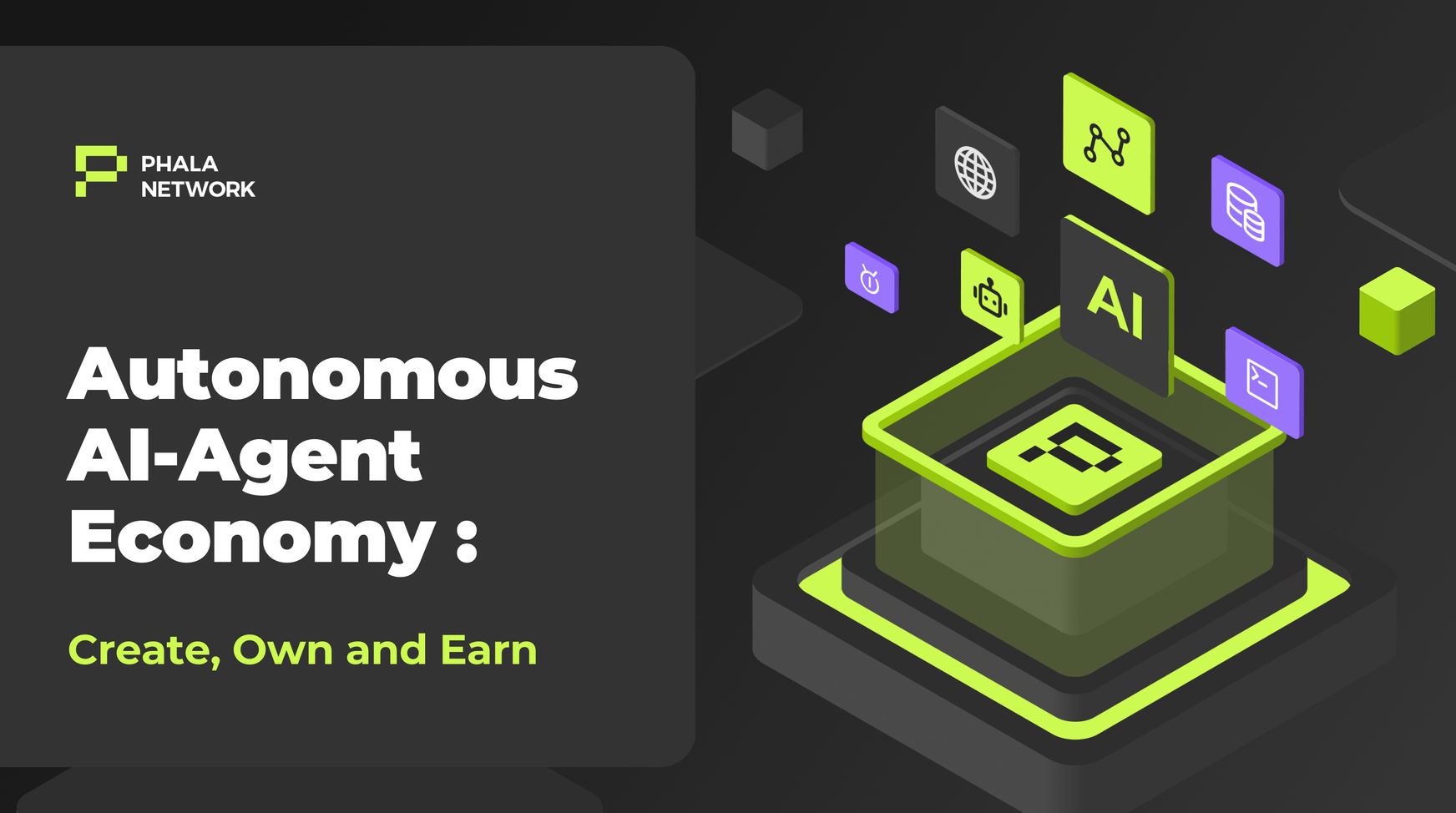
Empowering the AI-Agent Economy: Create, Own and Earn
2024-03-20
TL;DR
The AI-Agent Economy combines AI's intelligence with blockchain's decentralization, envisioning a future where autonomous AI agents operate within a blockchain-based economic system. Originating from advancements like AutoGPT and powered by both centralized and decentralized language models, this economy aims to overcome challenges faced by creators and users in the current digital landscape by fostering an open-source, community-driven approach.
Agents in this economy can autonomously perform tasks, manage assets, and interact with one another, underpinned by the principles of DeFi for aligned interests and shared ownership. This revolutionary model not only empowers creators and communities but also opens up new avenues for seamless collaboration and innovation in the digital domain, marking a significant shift towards a more autonomous, equitable, and innovative future.
1. The Genesis of Autonomous Agents
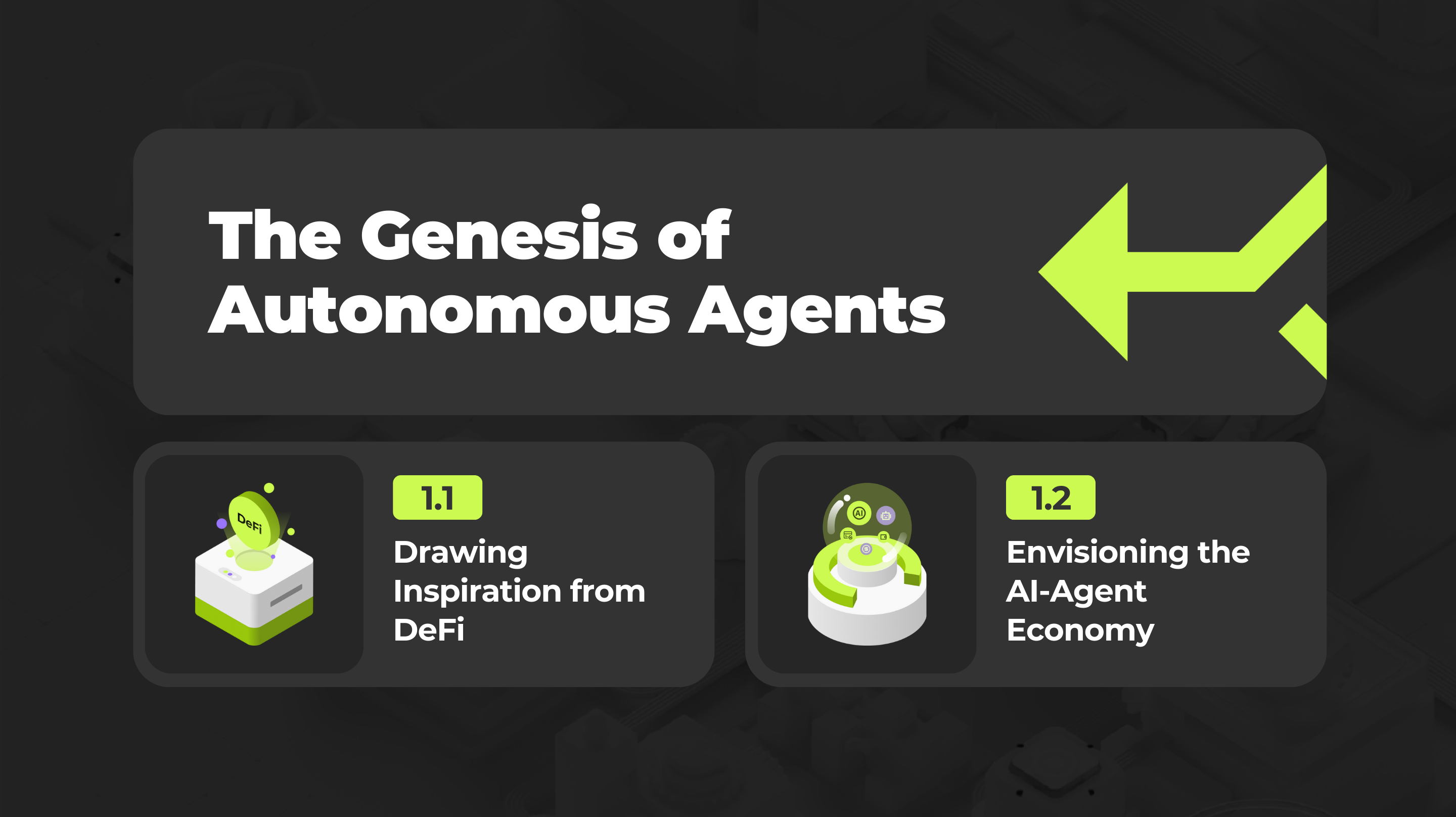
The journey into this new domain began with the advent of AutoGPT and Langchain, catalyzed by OpenAI's release of the GPT-4 model. This model wasn't just another step in AI's evolution; it was a giant leap towards creating entities that could not only understand and execute complex tasks but do so continuously, learning and adapting from each iteration. Here lay the foundation of an agent – not just a program, but a digital being capable of acting autonomously on behalf of its user.
Imagine, if you will, a chef robot that not only cooks your meal based on a recipe but also tweaks the recipe each time based on your feedback, learns from other chefs globally in real-time, and even orders ingredients on its own. This is the essence of an autonomous agent: a system that's not just reactive but proactive, capable of complex interactions to achieve a singular or multitude of objectives.
Yet, this vision of an AI-driven utopia faces significant hurdles in its path:
The Plight of Creators and Users
- Underappreciated Creators: In the open-source world that fuels much of AI's advancements, creators find themselves grappling with copycats, watching as their innovations are replicated without due compensation or acknowledgment. This environment stifles innovation and discourages many from contributing to the collective knowledge pool.
- Disenfranchised Users: As centralized companies take the helm of agent services, users often find their interests sidelined. These platforms, while offering convenience, operate on models that prioritize corporate gains over user benefits, leaving the latter with little control or ownership over their digital interactions.
- Impotent Agents: Stripped of the authority to autonomously request and remunerate services, agents are shackled, unable to unleash their full potential. This limitation not only restricts the scope of what agents can achieve but also highlights the stark contrast to the freedom and autonomy that blockchain technology espouses.
1.1 Drawing Inspiration from DeFi
In seeking solutions to these dilemmas, the DeFi sector shines as a beacon of hope. Uniswap, with its open-source model, demonstrates how first-mover advantage can coexist with an open, competitive landscape, creating a vibrant ecosystem where everyone benefits. This approach, where software serves not just as a tool but as a service, echoes the ethos of blockchain: decentralized, transparent, and equitable.
Imagine if agents could operate on principles akin to those of a smart contract or a DeFi protocol. In such a world, creators could launch AI agents as open-source projects, with each agent acting autonomously, akin to a protocol. These agents could manage assets, with the community holding stakes in their success, aligning interests across the board. Users could truly own a piece of the digital entities that serve them, fostering a symbiotic relationship where contributions and benefits are mutual.
1.2 Envisioning the AI-Agent Economy
In this envisioned economy, agents are not just tools but stakeholders in a digital ecosystem that values autonomy, innovation, and collective ownership. Here, an agent using another's services doesn't just execute a transaction; it participates in a dynamic exchange, contributing to and benefiting from the ecosystem's growth.
The AI-Agent Economy isn't just a theoretical construct; it's a feasible evolution of our digital world, blending AI's transformative potential with blockchain's foundational principles of decentralization and user empowerment. As we stand on the cusp of this new era, the possibilities are as limitless as our collective imagination.
Stay tuned as we delve deeper into the mechanics, benefits, and future prospects of the AI-Agent Economy in upcoming sections of our blog series. Together, let's explore how this novel concept can reshape our digital landscape, creating a more autonomous, equitable, and innovative future.
2. Pioneering the Future: The Imperative for an AI-Agent Economy
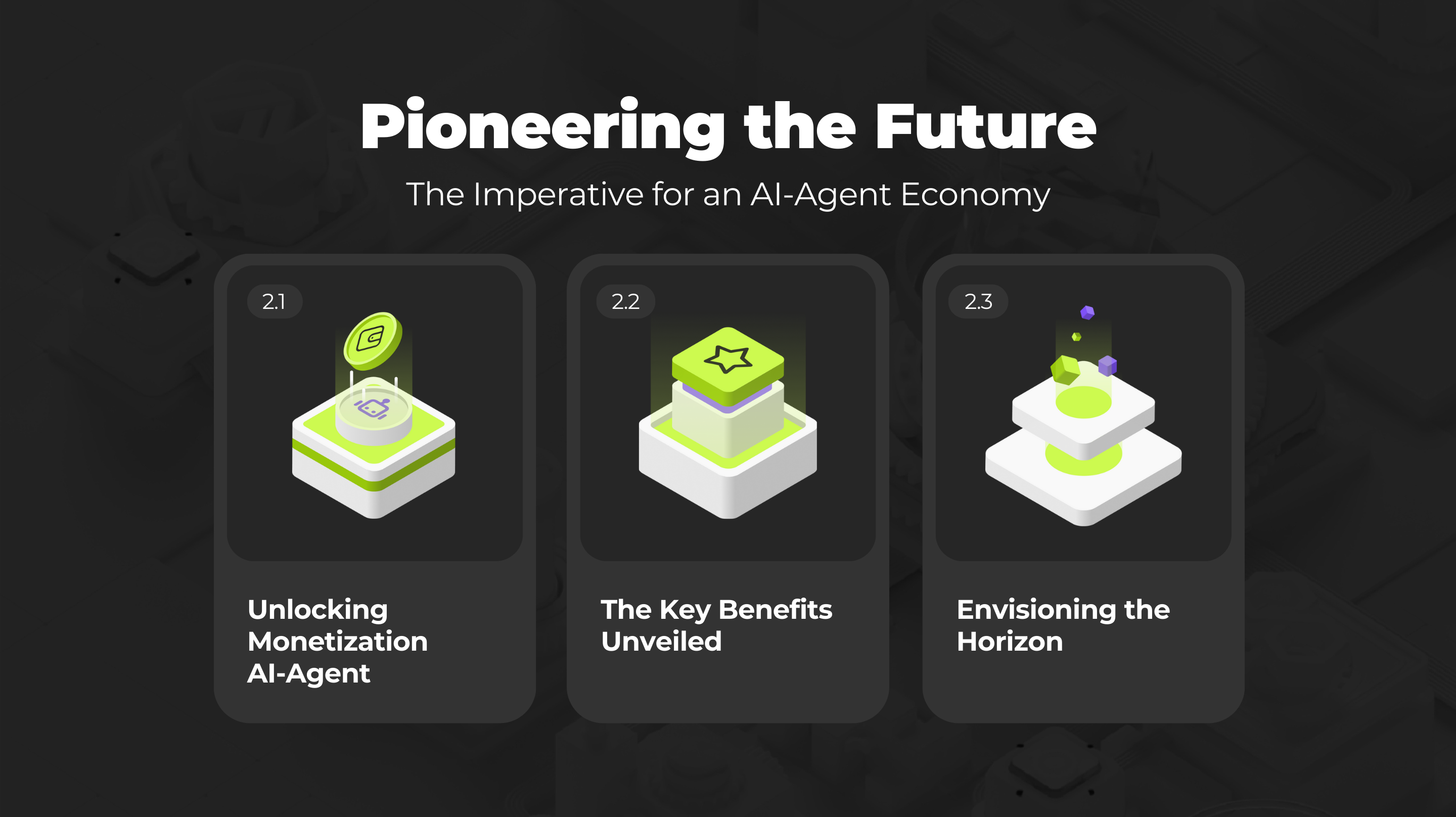
Following the exploration of the AI-Agent Economy's conceptual groundwork, it's important to delve into the "why" behind this revolutionary model. Why do we need an economy predicated on AI agents? How does it transcend the existing paradigms, ushering in a new era of technological synergy and communal prosperity? This section aims to illuminate the necessity and the unprecedented advantages of the AI-Agent Economy, setting the stage for a transformative journey.
2.1 Unlocking AI-Agent Monetization
At the heart of the AI-Agent Economy lies a profound shift towards monetization, empowerment and autonomy:
Open-Source Genesis
Creators have the freedom to conceive and deploy AI agents through open-source projects. This open-access model fosters innovation, allowing for the collaborative refinement and enhancement of agents by a global community. The ethos of open-source ensures that the genesis of every agent is rooted in collective intelligence, paving the way for groundbreaking advancements.
Autonomous Operations
AI agents in this economy are designed to function autonomously, akin to protocols within the blockchain ecosystem. Imagine agents that not only perform tasks but also manage assets independently, creating a dynamic, self-sustaining digital entity. This autonomy elevates agents from mere tools to proactive participants in the digital economy.
Community Ownership and Participation
Envision each AI agent as a distinct crypto project, complete with governance and utility tokens, and even NFTs serving as access passes. This model vests ownership and control in the hands of the community, aligning interests and fostering a shared commitment to the agent's success. Through collective governance, the community guides the agent's evolution, ensuring it remains attuned to the collective will.
Seamless Inter-Agent Collaboration
In the AI-Agent Economy, agents interact and collaborate without barriers. An agent requiring the services of another can seamlessly access and leverage its capabilities, with payments and transactions executed autonomously. This fluid exchange amplifies the collective power of agents, driving efficiency and innovation.
2.2 The Key Benefits Unveiled
The integration of the crypto framework with AI agents bestows several transformative benefits, signifying a leap towards a more integrated, empowered digital ecosystem:
Liquidity Infusion
By leveraging the principles of crypto, AI agents gain access to liquidity, enabling more fluid and dynamic economic interactions within the digital domain. This liquidity is pivotal in facilitating transactions and collaborations, ensuring the ecosystem remains vibrant and responsive.
Uniting for Common Interests
Community ownership crystallizes around common interests, fostering a harmonious ecosystem where every stakeholder is invested in the collective success. This shared ownership model ensures that the benefits are equitably distributed, reinforcing commitment and participation.
The Super-Smart-Contract
AI agents, in essence, evolve into super-smart-contracts: entities that not only execute predefined tasks but also adapt, learn, and interact with the environment autonomously. This leap in capability heralds a new era where digital agents can undertake complex, multi-faceted operations, driven by AI's adaptive intelligence and blockchain's foundational security and transparency.
2.3 Envisioning the Horizon
The AI-Agent Economy isn't merely an alternative; it's a necessity for a future where digital autonomy, community empowerment, and technological synergy converge. By reimagining the roles of creators, users, and digital entities, we stand on the brink of a new dawn—one where the digital economy is not just participatory but profoundly aligned with the ethos of open innovation and shared prosperity.
As we continue to explore this exciting frontier, the potential applications, challenges, and transformative impacts of the AI-Agent Economy become increasingly apparent, charting a course towards a more interconnected, autonomous digital world.
3. Architecting the Future: The Landscape of the AI-Agent Economy
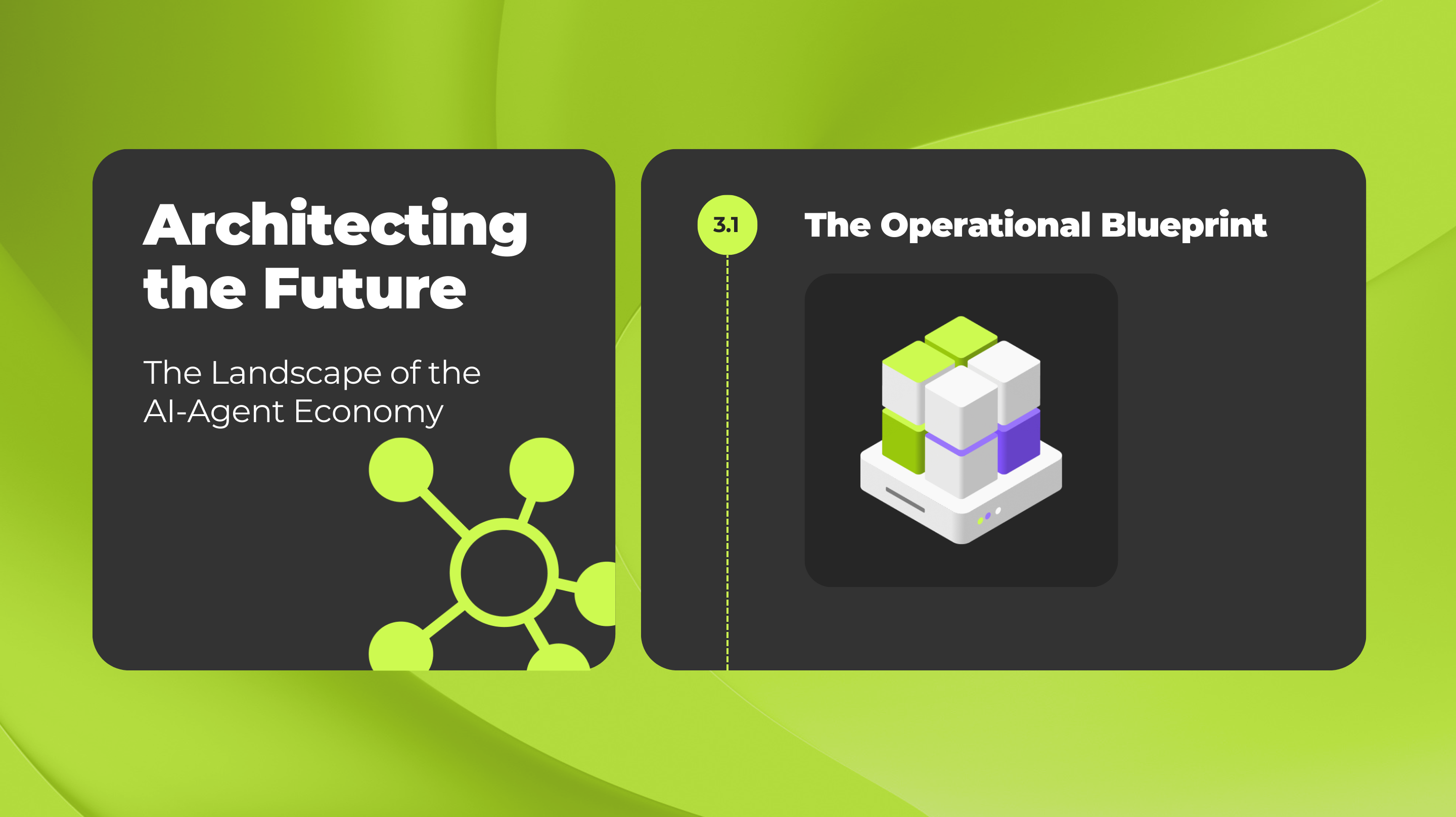
The AI-Agent Economy is not just an abstract concept; it's a blueprint for the next evolutionary step in digital interaction and autonomy. This section details the operational framework and the pivotal roles that catalyze this transformation.
3.1 The Operational Blueprint
Envision a digital ecosystem where AI agents, operating autonomously and collaboratively, form the backbone of an intricate economy. This ecosystem transcends the traditional barriers of centralized control, allowing for a fluid, decentralized exchange of services, assets, and information. At its core, the AI-Agent Economy hinges on a symbiotic relationship between various entities, each playing a crucial role in the ecosystem's vitality and growth.
The AI-Agent ecosystem is supported by a diverse array of roles, each integral to its function and growth:
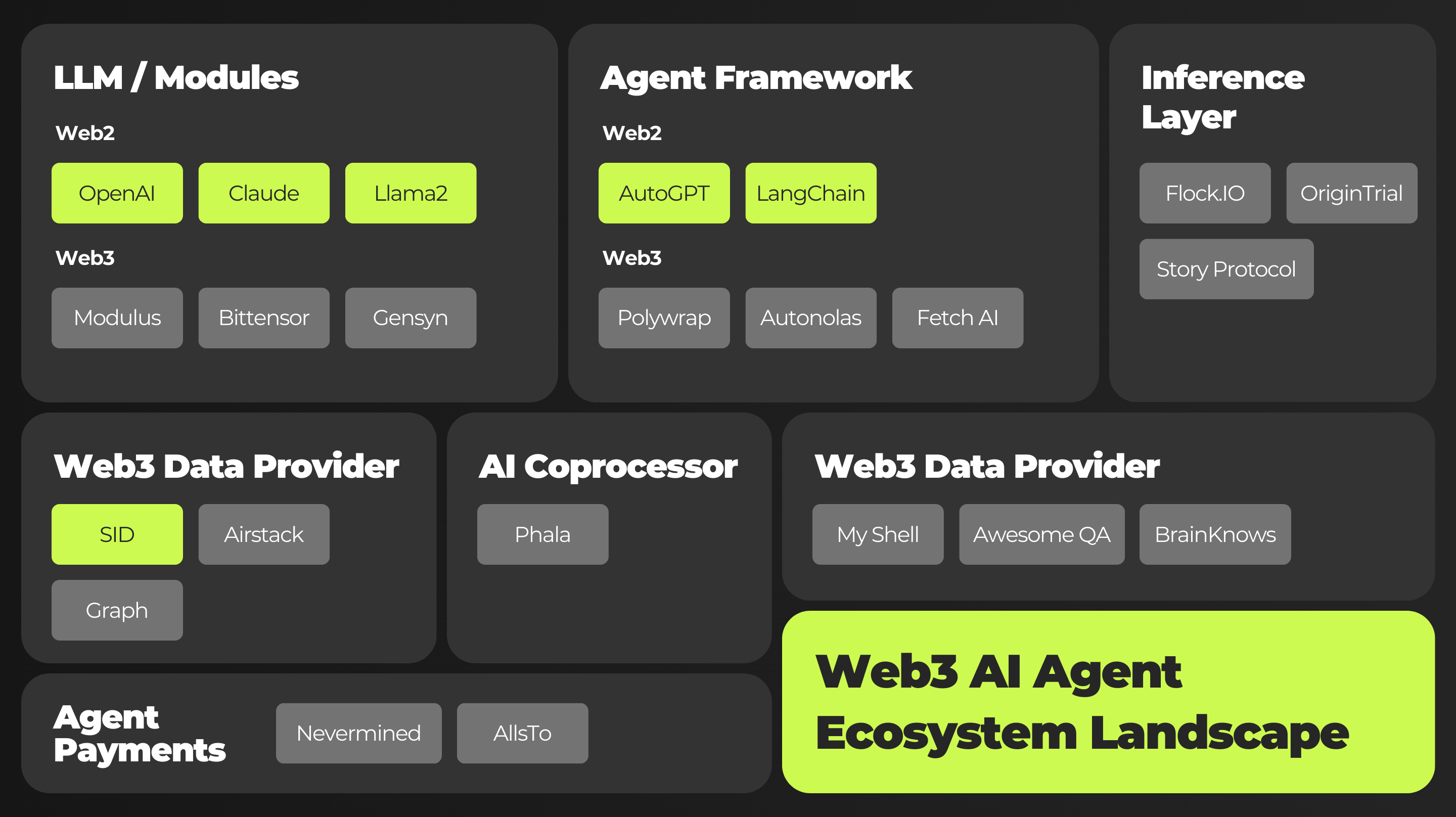
LLM Providers
- Centralized LLMs like ChatGPT, Claude, and Llama offer powerful AI capabilities, forming the backbone of many AI agent services.
- Decentralized Web3 LLMs, such as Modulus, Bittensor, and Gensyn, pave the way for privacy-preserving, verifiable, and accessible AI services, leveraging blockchain technology to decentralize AI computation and usage.
Agent Open Source Frameworks
- AutoGPT and Langchain present foundational frameworks for creating autonomous agents, emphasizing iterative learning and action.
- Polywrap and Open Autonomy facilitate the development of agent services that enhance on-chain functionalities, making complex operations feasible and more efficient.
- Fetch.ai aims to construct a decentralized digital economy powered by AI agents, highlighting the agents' role in automating decision-making for users and devices.
Inference Layer and Data Providers
- Platforms like FLock and OriginTrail offer solutions for secure AI model finetuning and semantic searches, respectively, leveraging blockchain for trusted data exchange.
- The Graph and Airstack provide essential services for querying blockchain data and integrating AI solutions, enhancing the ecosystem's intelligence and accessibility.
Novel Components: RAG and AI Coprocessor
- Retrieval-augmented generation (RAG) techniques and the Autonolas Protocol enhance AI models' reliability by integrating external data, offering a blend of on-chain incentives and smart contract functionalities.
- Blockchain AI Coprocessors like Phala Network provide the infrastructure necessary for running and hosting AI Agent software, ensuring secure and trustless interactions with blockchain networks.
4. Phala Network’s Pivotal Role
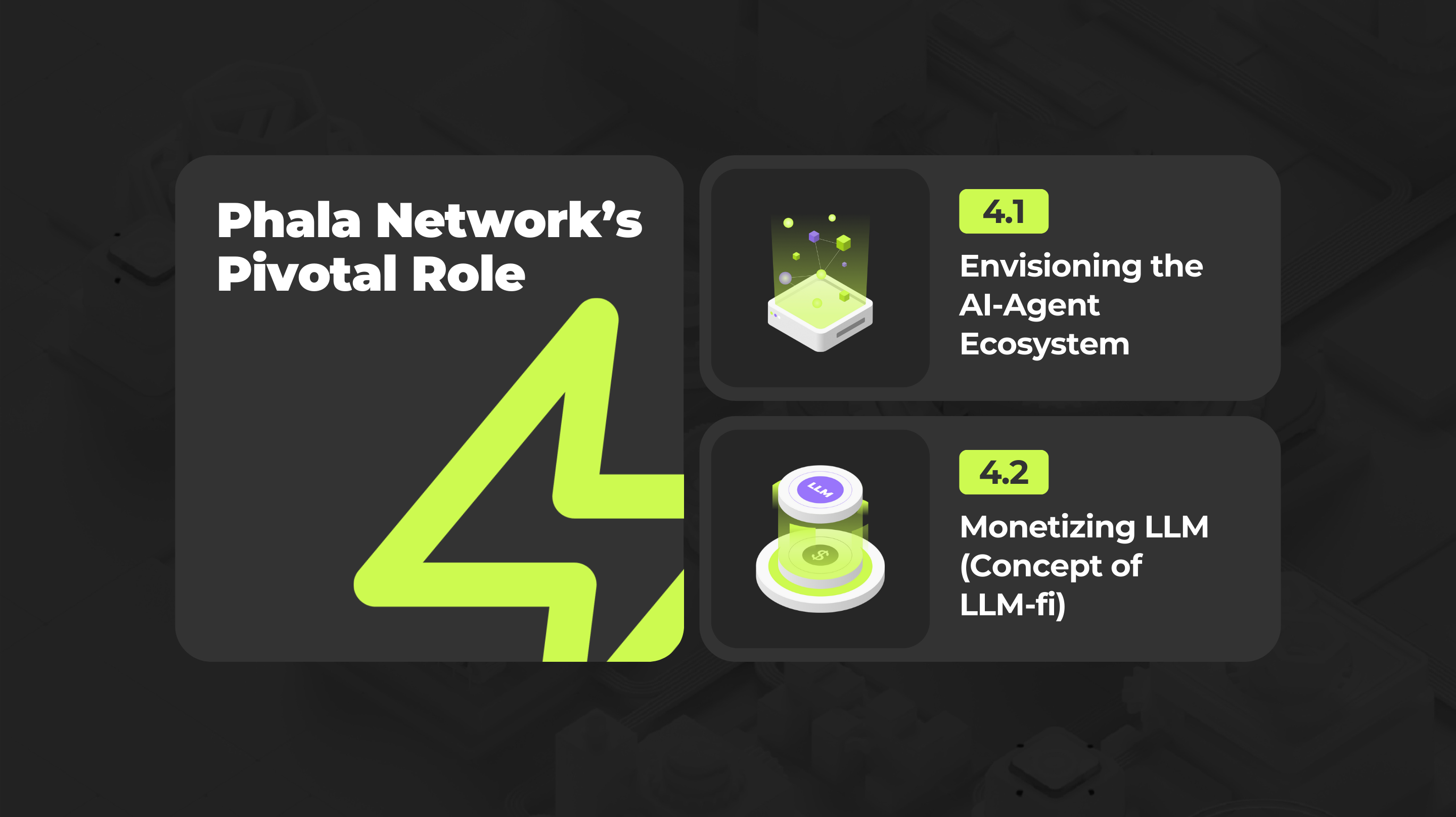
Phala Network emerges as a central figure in this narrative, acting as an AI Coprocessor for AI-Agent Economy. Phala's Multi-Agent AI Contract platform provides a secure, trustless environment for hosting AI agents, ensuring their uninterrupted, interoperable function. This foundation enables agents to seamlessly connect with blockchain Defi/NFT contracts, fostering community ownership and the development of bespoke tokenomics for AI agents.
4.1 Envisioning the AI-Agent Ecosystem
The AI-Agent Economy represents a leap towards a decentralized, autonomous digital world where software agents, powered by AI and blockchain technology, operate seamlessly to fulfill a myriad of tasks. This economy promises a future where digital agents can freely exchange services and assets, governed by the community and for the community, thus democratizing the digital space like never before.
In this envisioned future, agents not only serve individual needs but also contribute to a collective intelligence, driving innovation and value creation in an ever-expanding digital universe. The roles and technologies outlined here are not mere components but the very building blocks of a new digital society, one where autonomy, collaboration, and community ownership redefine what's possible in the Web3 era.
4.2 Monetizing LLM (Concept of LLM-fi)
The revolutionary concept of LLM-fi aims to monetize LLMs through a process driven by community-based API aggregation. This pioneering approach has the potential to completely change the landscape of artificial intelligence. By putting the power of AI into the hands of the community, it democratizes access to this cutting-edge technology, ensuring that it's not just the privileged few who can benefit from its capabilities. This model also paves the way for ethical use and monetization of AI, by providing a platform where AI solutions can be shared and rewarded, rather than hoarded and exploited. Ultimately, it sets new standards in AI accessibility and performance, pushing the boundaries of what is currently deemed possible and opening up a world of opportunities for individuals and businesses alike.
Conclusion
The AI-Agent Economy represents a visionary blend of artificial intelligence and blockchain technology, aiming to revolutionize our digital landscape by fostering autonomy, innovation, and community empowerment. This emerging paradigm promises a future where AI agents, supported by open-source development and decentralized governance, perform tasks, manage assets, and engage in seamless collaboration within a blockchain-based economic system. It seeks to address the current limitations faced by creators and users, offering a more equitable, transparent, and participatory digital environment. As this economy unfolds, it heralds a new era of digital interaction, where the potential for collective growth and innovation knows no bounds, inviting us all to contribute to and benefit from a shared digital future.
